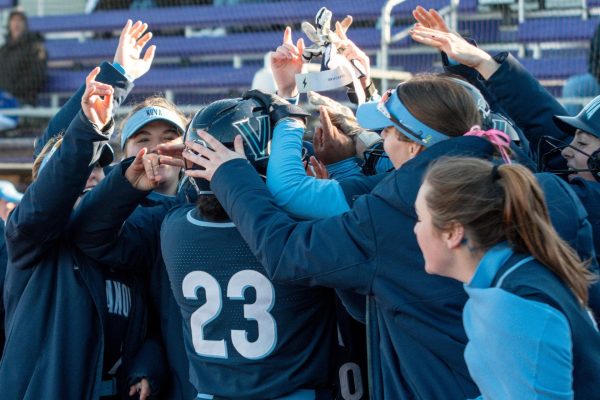Fire drills result in judicial consequences
November 11, 2009
Four to five rooms per residence hall are inspected during each of the three sets of unannounced fire drills that occur over the academic year, often resulting in judicial consequences for residents whose rooms are in violation of University policy.
Although the inspections are conducted for the primary purpose of ensuring fire safety, residents are subject to disciplinary action for violations both related and unrelated to fire safety policies.
A handful of residents are documented for each area of concern – which includes fire as well as alcohol or drug violations – after every fire drill, according to Assistant Dean of Students for Judicial Affairs Ryan Rost.
During the routine inspections, a Residence Life coordinator, a Public Safety officer and a representative from the Department of Environmental Health and Safety enter the rooms, which have been preselected at random prior to first semester, and document any visible fire safety violations on a form from the Office of Residence Life. Public Safety also submits a broader report to Judicial Affairs.
“The environmental rep might point out a fire safety violation, and Public Safety will confiscate it,” Director of Environmental Health and Safety Erika AllenLynch said.
Possible violations are listed on the form for inspectors to mark, but none of the options pertains to alcohol or drug violations. Inspectors will cite the observation of an illegal bottle of liquor in a separate space provided for “other areas of concern.”
“Alcohol, for example, is not listed on the form because the inspections are not intended to find alcohol violations,” Rost said.
Instead, the University inspects the random block of residence hall rooms during fire drills for safety reasons and insurance purposes, which, as a private institution, it reserves the right to do, according to Rost.
However, the forms do anticipate alcohol as a potential problem, as it notes the names and birthdates of the students residing in the room up for inspection.
Noting the birthdates of residents avoids any confusion regarding residents over the age of 21, who may legally have a moderate amount of alcohol in their rooms.
“We can’t just turn a blind eye to blatant violations,” Rost said.
Some students are uncomfortable with the inspections, which they feel violate the privacy and space of the rooms and apartments they pay to occupy for the year. The uneasiness may be fueled by rumors that circulate regarding the procedure.
“I was under the impression that every single room was searched during the designated fire drills,” junior and West Campus resident Molly Rigas said.
Administrators hold that the inspections are a necessary piece of fire safety procedures, while understanding the student apprehension surrounding them.
“We do want to respect the privacy of residents,” Rost said.
She added that the inspectors do not open drawers, closets or refrigerators.
“Some people may feel that their space is being invaded, but the small amount of rooms we enter shows that the inspections are not conducted to police the rooms,” AllenLynch said. “Otherwise, we’d do more.”
Inspecting every residence hall room, while time consuming, would be within the University’s rights as a private institution.
Specifically, fire safety inspections take place to ensure that evacuation occurs, according to administrators who fall under the umbrella of the Fire Drill Committee, which includes Residence Life, Environmental Health and Safety and Public Safety along with Facilities and Maintenance Services.
“The main purpose is to ensure that students are evacuated,” said AllenLynch, who added that one to two students are found in the buildings almost every drill. “Sometimes it’s people who were in the shower, but you’d be surprised. One resident was just at his desk on his laptop.”
Residents who fail to evacuate a building when an alarm is sounding, regardless of whether it is a drill, false alarm or actual alert, are subject to a minimum fine of $100 and other disciplinary action, according to the University’s policy on conduct with respect to fire safety as set forth in the student handbook.
“If we don’t enter, our biggest concern is that people won’t leave,” said Director for Residence Life Tom DeMarco, reiterating AllenLynch’s concern.
However, one criticism of the inspections and the resultant judicial consequences for violations is that the first reaction of students might be to hide their belongings rather than evacuate immediately.
“Our hope is that students will not have illegal items,” Rost said, noting that confiscation and fines should deter students from bringing prohibited items in the first place and ensure the safety of all residents.
Residents are told not to bring hot plates, toaster ovens, space heaters, appliances with an open heating element, candles, incense and potpourri burners, according to the Residence Life list of Fire Safety Procedures online.
“Offenders are usually the ones that complain,” AllenLynch said. “Others could care less.”
All violations, whether they cite toasters, alcohol or drug paraphernalia, are forwarded to Rost, who follows up on the violations.
For some situations, students are given the opportunity for corrective action, which the resident assistants follow up on, but for other fire hazards like candles prohibited items are confiscated and not returned.
Candles, which are the most common violation, are disposed of; drugs and paraphernalia are given to the police for disposition; and alcohol is thrown out in a locked dumpster, according to Rost.
Residents are additionally subject to a fine for having candles in their rooms, which is a policy consistent with those of the University’s peer institutions, according to Rost.
According to the Student Handbook, the University reserves the right to sanction the residents of a room or apartment where a violation occurs whether or not the residents are present at the time of the violation.
However, the judicial consequences are determined on a case-by-case basis, taking into consideration the disciplinary history of the student, precedent and University guidelines.
“If the alcohol violation is not a result of a disruptive party, that’s taken into consideration,” Rost said.










